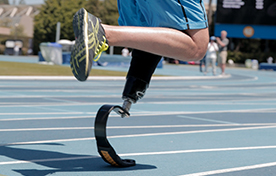Being a Proactive Patient: What does it take?
-by Kevin Carroll, MS, CP, FAAOP
Many situations require us to decide what we want and then figure out how to get it. This process is sometimes called “information gathering” or “problem-solving.” I simply call it “being proactive.”
Being proactive as an amputee means that you take the leading role in your prosthetic care and rehabilitation. Though doctors, prosthetists, therapists and friends can all provide good advice and support, only one person will be there through every phase of your care and rehabilitation, pressing through each challenge and celebrating each achievement. That one person is you. In spite of the fear, depression, pain, frustration, exhaustion, and physical and emotional limitations you may be experiencing, you must be your own best advocate. Asking questions, doing your own research, standing up for what you believe you deserve, expecting a lot from your care team; these are the hallmarks of being proactive.
Getting Started
If the word proactive doesn’t exactly describe you, keep in mind that even “nice” people can learn to be proactive. You can be direct and nice. You can have high expectations and be nice. Clearly, being rude and difficult to deal with are usually not effective ways for people to get what they want. But being proactive is another matter entirely. Being proactive often increases your sense of confidence and can help you feel more optimistic about the future. The more you present yourself in a proactive manner, the easier it gets. When you’ve “done your homework” on a subject, asking for what you need is not so difficult because you know what you’re talking about. When being proactive leads directly to the result you were after, you’ll be willing to use this approach again when the situation calls for it. Remember the truth in that old saying, “The squeaky wheel gets the grease.” Being withdrawn or undemanding will not get you closer to what you want. I have repeatedly seen that people who expect more and ask for more tend to get more.
The Youngest and the Oldest
The importance of being proactive as a patient and consumer is heightened when the person is at either end of the age spectrum. People older than 60 and parents of infants or young children with prosthetic needs may find that they are not being encouraged by their healthcare providers in the same way as young, active adults. Unfortunately, recovery expectations are sometimes lower for older adults because of their age and/or other health-related issues. Yet I have worked with hundreds of people in their 70s, 80s and 90s who have been very successful prosthesis users (see pages 10-16 for related articles). Still, older adults and their healthcare providers may have to stand up and argue to get insurance companies to pay for the components they believe will help them the most.
Regarding children, some physicians and prosthetists believe that it is not necessary to rush babies and younger children into prosthetic care; however, there are still several reasons to begin consulting with a prosthetist as soon as possible, even if you ultimately decide that you will not pursue prosthetic care for you child. Being proactive means believing that whether the person is very young or very old, he or she deserves every opportunity to be successful.
Proactive Relationships
A good place to start being proactive is in your interactions with healthcare providers, beginning with your doctors. People who are facing amputation need to know every option that is available to them before undergoing surgery. Ask your doctors to explain various surgical options, what you can expect after surgery, and what their recommendations are for prosthetic care, including the use of Immediate Post-Operative Prostheses (IPOPs). Ask for information resources, and then follow up with your own research on the Internet and in medical and prosthetic journals. Always seek a second medical opinion before undergoing surgery. And if your physician does not refer you to a prosthetist for a preoperative consultation, take the initiative to schedule one on your own. Remember: Once you have recovered from surgery, you will have little or no contact with the surgeon, but you will require the services of a prosthetist for the rest of your life. The sooner you begin building this relationship, the better. You have every right to request a preoperative consultation that includes you, the surgeon and the prosthetist. If you have had an emergency amputation without the benefit of a preoperative consultation, you are entitled to a detailed postoperative discussion with the surgeon, and you should also request a meeting with a prosthetist as soon as possible. In addition, you might benefit from talking to an Amputee Coalition -certified peer visitor who has experienced the same or similar surgery and recovery. Don’t wait for the doctor, prosthetist or anyone else to suggest this; be proactive. Contact the Amputee Coalition of America at 888/267- 5669 to help you locate a certified peer visitor in your area.
As you move into the rehabilitation phase of your recovery, you will be working closely with a prosthetist, a physical therapist, and possibly an occupational therapist. All of these professionals will provide you with information and options to consider. Again, be proactive; be prepared to tell them your rehabilitation goals and ask plenty of questions about techniques and products. Supplement this by using the search engine on your computer to tap into an array of information to help guide you through the process of selecting and fitting a prosthesis and to help you learn how to get the most from your rehabilitation. If at any point you feel you are not being heard by your prosthetist or therapist, it is your right to seek a consultation with a different provider and decide if he or she can better meet your needs. Unfortunately, it is necessary for some prosthesis users to have revision surgery to achieve better fit and function of their prosthesis. If you are ever advised to have revision surgery, approach the situation proactively by:
- Seeking at least two medical opinions
- Seeking at least two prosthetic opinions
- Requesting to meet with one or more people who have had similar revision surgeries
- Doing some independent research on revision surgery procedures and options and subsequent prosthetic options.
Educating Yourself
Every person with a limb difference can benefit from the wealth of information that is available through the Amputee Coalition . Amputee Coalition publications and the Amputee Coalition Web site (www.amputee-coalition.org) are some of the best resources for educating yourself about amputation, prosthetics, rehabilitation and lifestyle recovery. The Web site also offers an online support group, an online library catalog of amputationrelated materials, and links to other key sites, publications and journals.
In recent years, the market for prosthetic components has exploded with choices. There are hundreds of socket designs, feet, hands, knees, and accessories to select from. It can be overwhelming to try to determine what is best for your specific situation so educate yourself as much as you can and allow your prosthetist to help guide the decision-making process. Learn about the components you are interested in, and, whenever possible, talk directly with others who are using them. Remember, however, that just because a certain item works great for someone else, it does not mean that the item will be exactly right for you. Fortunately, some manufacturers will allow a trial period for their components so be sure to ask if this is an option. Look at what is important in your life, what activities you wish to pursue, and use this to guide your questions, research efforts, and your choice of components. Also keep in mind that product marketing and advertising are methods for increasing the sales of specific items. Balance the fabulous claims you may read about in ads with the input of your prosthetist, the experiences of other users of the products, and the more objective information you are able to gather on your own.
Ultimately, your choice of components may be dictated by your managed-care organization or Medicare. If you are in sharp disagreement about the components your plan will cover, you will have to be prepared to stand up and argue your case. Your doctor and prosthetist can be very helpful in this process. If you cannot get authorization on certain items, these healthcare providers can help you get authorization or determine the next best choice. If nothing else works, you have the option of paying for the item out-of-pocket. Still, that’s something you’d probably like to avoid.
Be Proactive!
Remember: Being proactive is your choice. Make it happen by asking questions, doing research, standing up for what you deserve, and setting high expectations for your healthcare team. ?
About the Author
Kevin Carroll, MS, CP, FAAOP, has been a practicing prosthetist for 28 years. He is the vice-president of prosthetics for Hanger Prosthetics & Orthotics in Bethesda, Maryland. He presents scientific symposiums to healthcare professionals both nationally and internationally and manages one-day prosthetic clinics for patients with complex cases.
Disclaimer: The following information is provided and owned by the Amputation Coalition of America and was previously published on the website http://www.amputee-coalition.org or the Coalitions Newsletter, inMotion.








